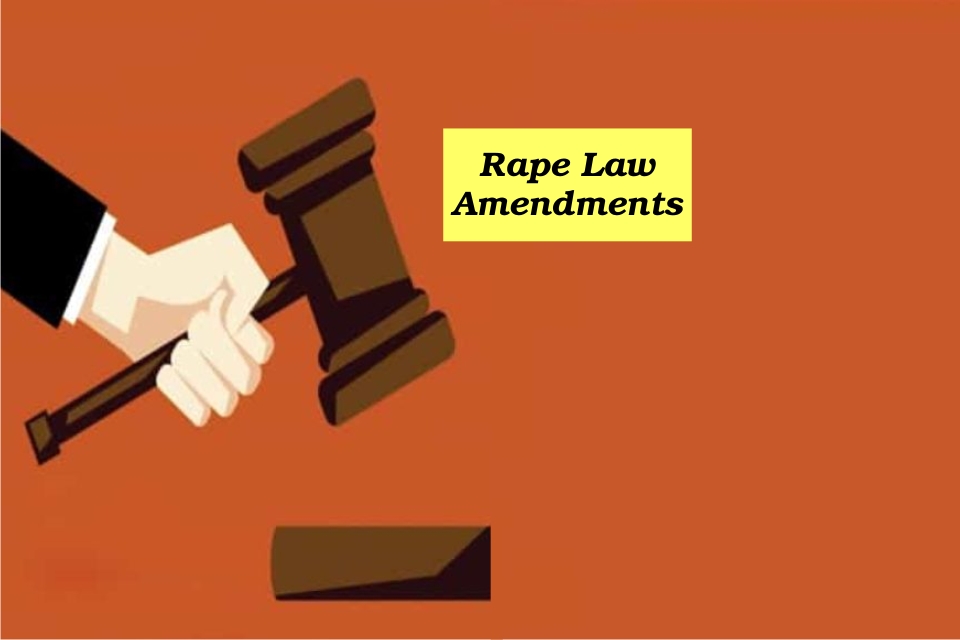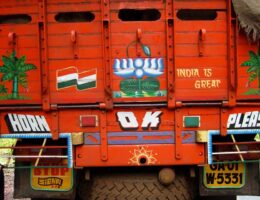What is Rape?
A man is said to commit “rape” if he—
- Penetrates his penis, to any extent, into the vagina, mouth, urethra or anus of a woman or makes her to do so with him or any other person; or
- Inserts, to any extent, any object or a part of the body, not being the penis, into the vagina, the urethra or anus of a woman or makes her to do so with him or any other person; or
- Manipulates any part of the body of a woman so as to cause penetration into the vagina, urethra, anus or any part of body of such woman or makes her to do so with him or any other person; or
- Applies his mouth to the vagina, anus, urethra of a woman or makes her to do so with him or any other person
When it is called Rape?
Under the circumstances falling under any of the following seven descriptions1:
- Firstly, against her will.
- Secondly, Without her consent.
- Thirdly, With her consent, when her consent has been obtained by putting her or any person in whom she is interested, in fear of death or of hurt.
- Fourthly, With her consent, when the man knows that he is not her husband and that her consent is given because she believes that he is another man to whom she is or believes herself to be lawfully married.
- Fifthly, With her consent when, at the time of giving such consent, by reason of unsoundness of mind or intoxication or the administration by him personally or through another of any stupefying or unwholesome Substance, she is unable to understand the nature and consequences of that to which she gives consent.
- Sixthly, with or without her consent, when she is under 18 years of age.
- Seventhly, when she is unable to communicate consent.
Exceptions:
- A medical procedure or intervention shall not constitute rape.
- Sexual intercourse or sexual acts by a man with his own wife, the wife not being under 15 years of age, is not rape.
- In Independent Thought v. Union of India,[1] a division bench of the Supreme Court of India read down Exception 2 to Section 375, Indian Penal Code (hereinafter, IPC), which now stands thus altered, “Sexual intercourse by a man with his wife, the wife not being less than 18 years of age, is not rape”
Major Amendment in Rape Laws

1983: Mathura bai rape case
Mathura was a young orphan tribal girl living with one of her two brothers. She was an Adivasi. The incident is suspected to have taken place on 26 March 1972, she was between 14 and 16 years old at that time. Mathura occasionally worked as a domestic helper with a woman named Nushi. She met Nushi’s nephew named Ashok who wanted to marry her, but her brother did not agree to the union and went to the local police station to lodge a complaint claiming that his sister, a minor, was being kidnapped by Ashok and his family members. After receiving the complaint, the police authority brought Ashok and his family members to the police station. Following general investigation, Mathura, her brother, Ashok, and his family members were permitted to go back home. However, as they were leaving, Mathura was asked to stay behind while her relatives were asked to wait outside.Mathura was then raped by the two policemen.
When her relatives and the assembled crowd threatened to burn down the police chowky, the two accused policemen, Ganpat and Tukaram, reluctantly agreed to file a panchnama (legal recording of evidence).
- Tukaram V. State of Maharashtra (A.I.R 1979 SC185)
- This was a custodial rape case
- Result of this judgement (Criminal law (amendment) act, 1983)
- Burden of proof lies on accused.
- Custodial rape falls under 376(2).
- Section 376A – 376D added.
- Disclosing identity of victim punishable (added section 228 in IPC).
2013: Nirbhaya case/ Delhi gang rape case
The 2012 Delhi gang rape and murder case involved a rape and fatal assault that occurred on 16 December 2012 in Munirka, a neighbourhood in South Delhi. The incident took place when Jyoti Singh, a 23-year-old female physiotherapy intern, was beaten, gang-raped, and tortured in a private bus in which she was travelling with her male friend. There were six others in the bus, including the driver, all of whom raped the woman and beat her friend. Eleven days after the assault she was transferred to a hospital in Singapore for emergency treatment but died two days later.
The Cabinet Ministers on 1 February 2013 approved for bringing an ordinance, for giving effect to the changes in law as suggested by the Verma Committee Report. According to former Minister of Law and Justice, Ashwani Kumar, 90 percent of the suggestions given by the Verma Committee Report have been incorporated into the Ordinance. The ordinance was subsequently replaced by a Bill with numerous changes, which was passed by the Lok Sabha on 19 March 2013.
The Criminal Law (Amendment) Ordinance, 2013 .This new Act has expressly recognised certain acts as offences which were dealt under related laws.
- Resulted in criminal law amendment ordinance ,2013
- Based on the recommendation of justice verma committee.
- Recommendations of committee
- Broadening the definition of rape, capital punishment for rape cases that have led to death or rendered the victim in a ‘persistent vegetative state’ and a minimum of 20 years imprisonment for gang rape.
- New offences such as stalking, acid attacks, and voyeurism were added into the definition of rape. The minimum sentence was changed from 7 years to 10 years.
- Stricter punishments for registering complaints of rape.
- Bill of rights for women which gives dignity & respect to women over their choices of sexual relationships & for their sexual autonomy.
- Age of juvenile changed from 18 yr to 16 yr with certain restrictions.
2018: The Kathua Rape Case (Mohd. Akhtar v. State of Jammu and Kashmir)
Kathua rape case involved the abduction, gang rape, and murder of an 8-year-old girl, Asifa Bano, in January 2018 in the Rasana village near Kathua in Jammu and Kashmir, India. A chargesheet for the case was filed, the accused were arrested and the trial began in Kathua on 16 April 2018.The victim belonged to the nomadic Bakarwal community. She disappeared for a week before her body was discovered by the villagers a kilometer away from the village.
on 12 January 2018, Mohammad Yusuf lodged a complaint in the Hiranagar police station stating that his daughter had gone missing. His complaint said that on 10 January 2018 his daughter, aged 8, had gone to watch over grazing horses at 12.30 p.m. She was seen at 2.00 p.m., but when the horses returned at 4.00 p.m., she was no longer with them. After searching for her and being unable to find her, her father registered a First Information Report (FIR) with the police.
On 17 January 2018, the body of the victim was found and taken into custody by the police to allow an autopsy to be conducted. The postmortem was conducted by a team of doctors at the District Hospital in Kathua at 2:30 PM on the same day. On 22 January 2018, the investigation of the case was transferred to Crime Branch and Crime Headquarters, Jammu and Kashmir. A statement released by the police listed seven individuals who had been arrested and charged over the crime, including four police officers. A total of eight people, including four police officers, were arrested. Two of the police officers were arrested on suspicion of attempting to destroy evidenceand of accepting money to cover up the incident. One of the accused claimed to be 15 years old, though a medical examination later suggested he was 19. Sanji Ram, one of the accused, was described by the police as having devised the plan of kidnap and murder. The chargesheet against the seven adults accused of the crime was filed on 9 April. The accused were charged under Sections 302, 376, 201 and 120-B of the Ranbir Penal Code. A chargesheet against the remaining individual was under preparation.
Sanji Ram was found to be the main accused in the case. He is the priest of the family temple, where the incident allegedly took place. The Hindu community of the village prays three times a day in that temple according to local people. His son Vishal and his nephew, a juvenile, were also accused in the case. The others who have been accused are Deepak Khajuria and Parvesh Kumar, who are police officers; Tilak Raj, a head constable and Arvind Dutta, a sub inspector. The police contested the claim that the nephew is a juvenile.Vishal Jangotra claimed to be in Meerut attending an exam. However, according to the Central Forensic Science Laboratory (CFSL), his signature does not match the signature on the exam attendance sheet.
- The death penalty for rape has long been demanded, this is the first time, where it has been actually introduced.
- The amendment under S. 376 additionally provides a provision for the fine to be payable to the victim of rape.
- Amendment was made to S. 376 (1), enhancing the term of punishment for offenders from 7 years to 10 years.
- Insertion of section 376AB, 376DA, 376DB
- Detainment for rape with girls below 12yr of age – 20 yrs (minimum) extend upto death sentence.
- Detainment for rape with girls below 16yr of age – 20 yrs (minimum) extend upto death sentence.
- Detainment for rape with girls above 16yr of age – 10 yrs (minimum)
- No provision for anticipatory bail for a person accused for rape or gang rape of a girl below 16 years of age.
- If different punishment in IPC and POCSO then punishment which is higher will be given.
Rise in number of rape cases over the years
Crime against women have been constantly rising over the years. According the NCRB report following are the statistics :-
- 2019 – 4,00,000 cases
- 2018 – 3,78,000 cases
- 2017 – 3,59,000 cases
According to the experts it could be much worse as most of such crimes are not even reported.



- Dear readers, stay tuned for next article which is going to be “Types of rape and their Punishments” also if you have any queries or suggestions regarding topics or article let me know in comment section or mail us at lawgicalfirst@gmail.com
- Source: Wikipedia, YG Law (Youtube) https://youtu.be/wGhQlj5Zosw?t=2, Times of India https://m.timesofindia.com/, Finology legal, Books & Bareact.



